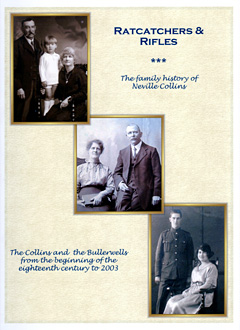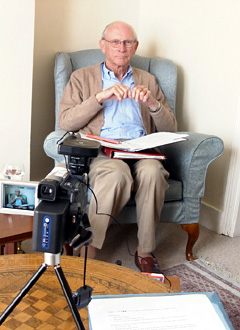|
5-2-6@¹ïƵÄÌrfIEJER[_[
N's approach to family history research A The Video Camera Recorder as a Tool
I used a Camcorder in the course of interviews I did for my research on Hammersmith and the founding and development of the Grove Neighbourhood Council and I give here an example of such use in the interview I conducted with N., born 1925, a retired person who has been a Hammersmith resident since 1977 with his wife G. N. had spent all his adult years, apart from 4 compulsory years in the army 1943-47, working in various branches of education and his life was particularly linked to the British Empire. I was very interested in the genealogical research that he had been doing since 2000 and I wanted to discuss with him the fieldwork he carried out and the resources and archives he used to find out about his family history. In the following section, N. summarises his life and his research.
 cover of the family research report which N has written B N's approach to family history research N.writes: -
C The interview - why choose N?
I was attracted to Nfs work on his family history because there was a link with my recent research subject - British India. Our interests were different but we had both looked at the lives of people who had lived and worked in that part of the British Empire. I became interested in European vagrants in the India, following my previous research on beggars in Bangladeshi villages. At that time, I became aware of a law concerning beggars and vagrants. I wondered how a law could define such people and how beggars could be subject to some kind of control, given their social, cultural, and economic situation. It seemed to be too complicated to be the subject of regulation so I started to explore this question. The existing vagrancy law in Bangladesh is based on the Bengal Vagrancy Act 1943. Moreover, 70 years prior to this Act, a law to control European vagrants had been enacted and enforced in British India. When establishing the system of controlling and governing people, how did they define the category of beggars or vagrants and how did they enforce the law? I thought research on materials of the vagrancy law in the colony where various views interact would be a good opportunity to review my perspective on a society in which vagrants or beggars exist. Thus I chose this issue for my research abroad in 2001. Some of Nfs immediate forefathers were people whose living depended directly on the colonial system, while I am interested in poor Europeans who had almost dropped out of the system and had become the subject of the regulations. I often visited Nfs home and listened to his stories about the research that increased my knowledge of one aspect of the history of the United Kingdom in the 19th and 20th centuries. I planned the interview with him, thinking that this would be a good opportunity for N to develop his research and organise his information, for having to get your ideas across to a third party definitely throws new light on the research so far done. However, at that very moment in 2001, he fell ill and was unable to speak for quite a while. Instead, I suggested he start writing about his family history and about the process and the methodology of his research. I became fascinated by the fact that N, living in the present, had been able to trace some of the details of the past of his ancestors, especially those of the 19th century. There has been an organisation designed to record people moving between the sovereign country and the colonies in those times and it exists to this day.  "N speaks through the video camera" August 2003 One year later, Nfs voice had recovered and the interview took place in August 2003. By then, he had written 59 A4 pages of the family history. This report contains many family photos from his own albums and photographs of documents, copies of which he had collected from various archives in the UK and Canada. The result of his research is detailed in his report, so the interview consisted mainly of how his research had been developed. His voice changed each day, but he continued to speak to the camera. The process of his research, which he developed after many twists and turns, is certainly fieldwork. In the interview, I think N, who was a teacher for many years, in speaking about himself, his research, and his country, is directly addressing students through a video camera, rather than just talking to me. |